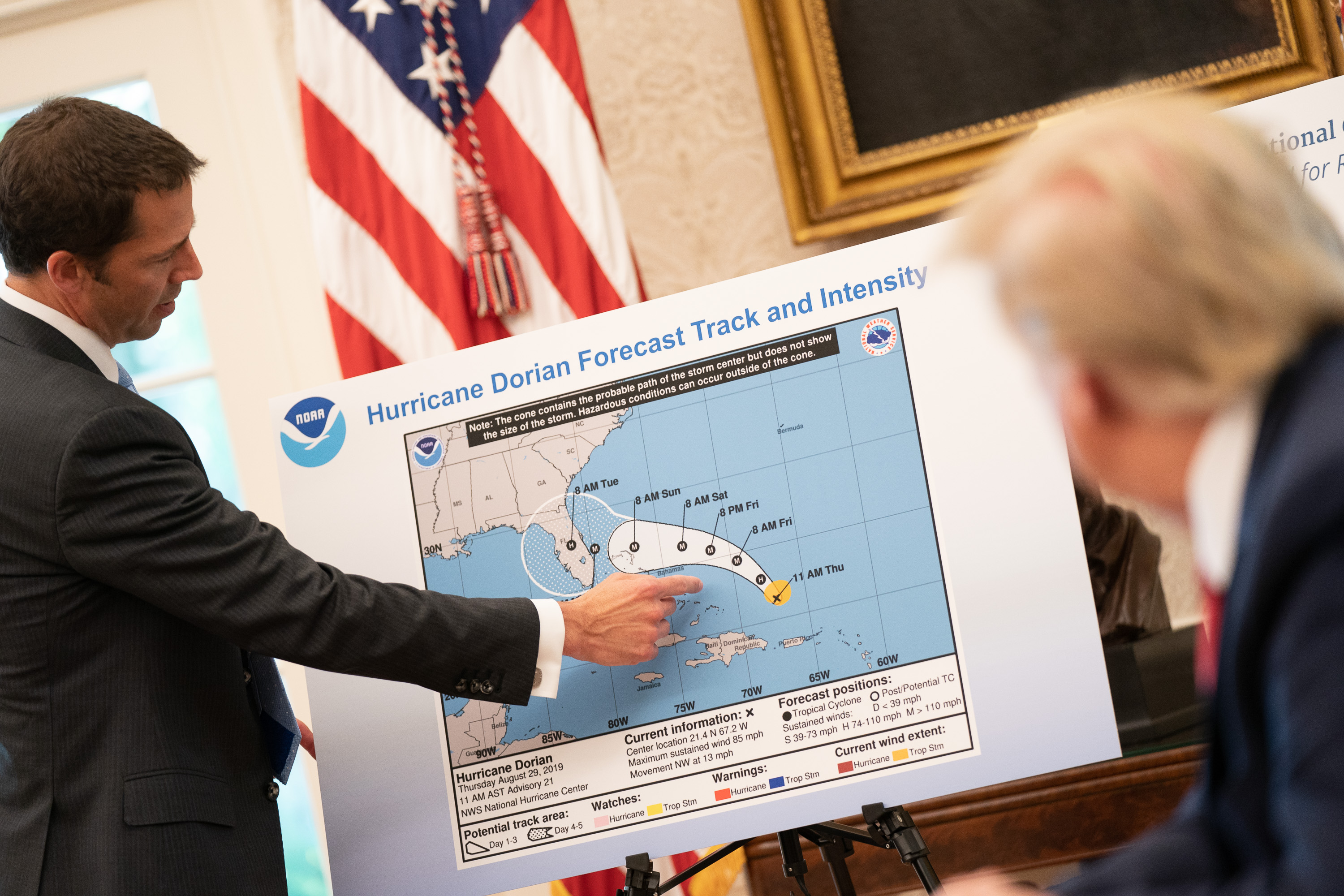How ‘Sharpiegate’ Turned a Simple Misunderstanding into a Media Frenzy — and Headache for NOAA Employees
Newly released public documents related to Hurricane Dorian show how an apparent misunderstanding spiraled into the politicization of basic government functions.

Newly released public documents related to the government’s response to Hurricane Dorian and the president’s infamous Sharpie-altered weather map show how an apparent misunderstanding spiraled into the politicization of basic government functions.
On Sept. 1, with Hurricane Dorian wreaking havoc in the Bahamas and poised to strike the southeastern United States, President Donald Trump tweeted that Alabama would “most likely be hit (much) harder than anticipated.” Twenty minutes later, the National Weather Service (NWS) in Birmingham sent a contradictory tweet, saying, “Alabama will NOT see any impacts from Dorian.” The media and the public read NWS Birmingham’s tweet as correcting the president — and apparently, so did the president.
A few days later, in a video from the Oval Office, Trump provided an update on the storm, referencing a map that was apparently doctored with a Sharpie pen to show the storm’s path veering into Alabama. Two days after the so-called “Sharpiegate,” the National Oceanic and Atmospheric Administration (NOAA) issued a statement seemingly chastising NWS Birmingham for its Sept. 1 tweet, saying it “spoke in absolutist terms that were inconsistent with probabilities from the best forecast products available at the time.”
American Oversight submitted Freedom of Information Act requests to NOAA on Sept. 24 for communications about either tweet and for any directives from the White House or the Commerce Department about the storm’s impact on Alabama. Last week, in response to a flood of FOIA requests on the issue, NOAA publicly posted an initial set of related records, including many that are responsive to American Oversight’s requests. The records reflect an apparent misunderstanding during a busy time for the agency. Perhaps more importantly, they also tell a story about how what should be an apolitical government function — advising and protecting the public during dangerous weather events — became so politicized that it dominated the news cycle for nearly a week.
First, the misunderstanding: As the media was quick to note, NWS Birmingham tweeted that Hurricane Dorian would not impact Alabama less than an hour after the president tweeted that the state was in the storm’s path. Many interpreted the timing as indicating that NWS was directly contradicting the president. However, emails released by NOAA suggest that before employees at the NWS Birmingham office were aware of Trump’s tweet, they received a sudden and seemingly out-of-the-blue influx of calls “asking about the hurricane and local impacts.” Those calls may well have been prompted by the president’s tweet, but it appears that NWS Birmingham’s tweet was in response to those calls alone. It was only after the media made the connection that “Sharpiegate” was set in motion.
Second, the internal impact: As this series of events set off a media frenzy, an Oval Office response, and reports that the Commerce Department ordered NOAA to retract NWS Birmingham’s tweet, NOAA and NWS personnel bore the brunt of public displeasure. Career employees at the agency worked to deal with the impact of the storm (not to mention wildfires in other parts of the country and developing tropical storm systems) while being blasted with comments from all sides.
For instance, one member of the public lambasted NWS for “undermining” the president and creating “over 5 days of hysterical media stories.” “Birmingham has created a real problem,” the writer said. “Like it or not, President Trump has a much larger media following than the main stream media which has been lying to the public for the last three years about President Trump colluding with the Russians.”
Another person rebuked NOAA for walking back NWS Birmingham’s tweet. “Who is the wimpy coward who won’t disclose his name on the Alabama debacle siding with Turmp?” they wrote. “How pathetic this individual must be. They need to slither back into the swamp. They have Trump stink all over them. If they had any self respect they would resign rather than enable this evil narcissist. SHAME! SHAME! SHAME!!!!!!!!”
Internal discussions of these and similar messages show the degree to which a simple action related to public safety was amplified by the president’s stubborn insecurity and transformed into a major issue for public affairs officials. As one NOAA official said of the messages, “These are getting very personal.”
But the messages from the public were not all harsh criticisms; some wrote to NWS Birmingham in support. One former NWS employee and meteorologist wrote: “I’m appalled at the statement released by NOAA criticizing your office for DOING YOUR JOB of providing the best possible information to the public. In my opinion you and your folks should be getting an award, not a rebuke. … Thanks to you and your staff for all that you do.” And an NWS Severe Weather Team from Texas sent the Birmingham office a Pizza Hut gift card, writing, “You’re probably having a rough day. Just a little something to show we support & appreciate you.”